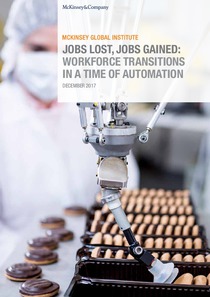Jobs lost, jobs gained: workforce transitions in a time of automation
"Automation is not a new phenomenon, and fears about its transformation of the workplace and effects on employment date back centuries, even before the Industrial Revolution in the 18th and 19th centuries. In the 1960s, US President Lyndon Johnson empaneled a “National Commission on Technology,...
| Main Authors: | , , , , , , , |
|---|---|
| Institution: | ETUI-European Trade Union Institute |
| Format: | TEXT |
| Language: | English |
| Published: |
Washington, DC
2017
McKinsey & Company |
| Subjects: | |
| Online Access: | https://www.labourline.org/KENTIKA-19306678124911248509-Jobs-lost,-jobs-gained-workfor.htm |
| _version_ | 1771659899277672450 |
|---|---|
| author | Manyika, James Lund, Susan Chui, Michael K. F. Bughin, Jacques Woetzel, Jonathan Batra, Parul Ko, Ryan Sanghvi, Saurabh |
| author_facet | Manyika, James Lund, Susan Chui, Michael K. F. Bughin, Jacques Woetzel, Jonathan Batra, Parul Ko, Ryan Sanghvi, Saurabh |
| collection | Library items |
| description | "Automation is not a new phenomenon, and fears about its transformation of the workplace and effects on employment date back centuries, even before the Industrial Revolution in the 18th and 19th centuries. In the 1960s, US President Lyndon Johnson empaneled a “National Commission on Technology, Automation, and Economic Progress.” Among its conclusions was “the basic fact that technology destroys jobs, but not work.”* Fast forward and rapid recent advances in automation technologies, including artificial intelligence, autonomous systems, and robotics are now raising the fears anew—and with new urgency. In our January 2017 report on automation, A future that works: Automation, employment, and productivity, we analyzed the automation potential of the global economy, the timelines over which the phenomenon could play out, and the powerful productivity boost that automation adoption could deliver.
This report goes a step further by examining both the potential labor market disruptions from automation and some potential sources of new labor demand that will create jobs. We develop scenarios that seek to address some of the questions most often raised in the
public debate. Will there be enough work in the future to maintain full employment, and if so what will that work be? Which occupations will thrive, and which ones will wither? What are the potential implications for skills and wages as machines perform some or the tasks that humans now do?
The report is part of the McKinsey Global Institute’s research program on the future of work, and is by no means the final word on this topic. The technology continues to evolve, as will our collective understanding of the economic implications. Indeed, we highlight some of the
limitations of our analysis and scenarios, and areas for further research. The report builds on our previous research on labor markets, incomes, skills, and the expanding range of models of work, including the gig economy, as well as the potential impacts on the global economy of digitization, automation, robotics, and artificial intelligence. " |
| format | TEXT |
| geographic | China Germany India Japan Mexico USA |
| id | 19306678124911248509_85e069a15e9b40bc88a2326381954814 |
| institution | ETUI-European Trade Union Institute |
| is_hierarchy_id | 19306678124911248509_85e069a15e9b40bc88a2326381954814 |
| is_hierarchy_title | Jobs lost, jobs gained: workforce transitions in a time of automation |
| language | English |
| physical | 148 p. Digital |
| publishDate | 2017 |
| publisher | Washington, DC McKinsey & Company |
| spellingShingle | Manyika, James Lund, Susan Chui, Michael K. F. Bughin, Jacques Woetzel, Jonathan Batra, Parul Ko, Ryan Sanghvi, Saurabh employment employment creation future of work digitalisation skill wages management development technological change Jobs lost, jobs gained: workforce transitions in a time of automation |
| thumbnail | https://www.labourline.org/Image_prev.jpg?Archive=137603595588 |
| title | Jobs lost, jobs gained: workforce transitions in a time of automation |
| topic | employment employment creation future of work digitalisation skill wages management development technological change |
| url | https://www.labourline.org/KENTIKA-19306678124911248509-Jobs-lost,-jobs-gained-workfor.htm |

